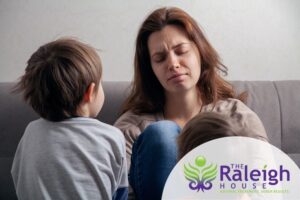
Drinking and drug use are similar to smoking in that there are secondhand effects that affect those around you. Every time you drink, your children witness the results. Every time you get high, your kids have to suffer the consequences.
Whether it’s neglect, verbal abuse or physical violence, your kids lose out on their chance at a normal childhood. And unlike a minor scrape at the playground, childhood trauma can stick with a person throughout the rest of their life.
We know the last thing you want to do is hurt your family. But oftentimes, addiction doesn’t give you a choice and you’re left just as helpless as your kids. Fortunately, there is something you can do to protect your children from substance abuse.
In this article, we’ll explore what childhood trauma from addiction looks like, how that trauma can affect a child’s development into adulthood and what you can do to prevent any further damage.
What is Childhood Trauma?
Childhood trauma can be described as any negative event or abuse caused by a parent or other adult responsible for the child’s care. This abuse can take many different shapes, including:
- Physical Abuse: Any aggressive action or behavior that injures a child. These injuries can include cuts, bruises, broken bones and burns.
- Neglect: Neglect is any lack of behavior to care for the child. This includes leaving the child alone for long periods of time, failing to provide medical care for the child and not giving the child the food, clothing, shelter and attention needed.
- Sexual Abuse: Child sexual abuse is when an adult forces the child to engage in sexual behaviors with them against their will and understanding.
When a child experiences any or all of these types of abuse, they’re left feeling isolated, fearful and ashamed. They may not fully understand what is happening to them or why their mom or dad is hurting them, making it more difficult for them to process the abuse and ask for help.
How Childhood Trauma Lingers into Adulthood
Maybe you yelled at your kids a little harder than you would have if you were sober or pushed them down in a fit of aggression. Or maybe you forgot to pick them up from school because you were high. You may be writing these off as isolated incidents that don’t have long-term effects. But the truth is, they do.
In fact, childhood trauma can actually affect a person’s character and who they are at their core. Imagine your happy, rambunctious child growing into a depressed, angry and aggressive adult. The reality is childhood trauma can lead to emotional instability, behavioral problems and even addictive tendencies of their own.
Not convinced? It’s natural to downplay how your addiction is affecting your children. But consider this: Those who suffer from childhood trauma are four times more likely to develop an alcohol or drug addiction and are three times more likely to develop depression.
Unfortunately, childhood trauma can scar your kids for the rest of their lives and make it harder for them to live a fulfilling, successful and sober life.
View Photos Of Our Ranch
How to Help Your Kids Heal from Childhood Trauma
The very best thing you can do for your kids is to acknowledge that you have an addiction and seek treatment to overcome your substance abuse. The bottom line is if you don’t get treatment, the abuse towards your children will continue.
You’re putting your family first when you decide to get treatment. Credible addiction treatment like at The Raleigh House helps you get to the bottom of your substance abuse and develop healthy patterns of behavior that put an end to your addictive and aggressive thoughts and behaviors.
Family therapy is also a common part of addiction treatment, giving you the chance to work with your loved ones to heal and recover from the damage your addiction caused.
It’s also important to give her kids a safe place to work through their trauma. As you’re getting treatment for your substance abuse, your kids should also see a therapist who can help them process what they’ve been through and get them on a path to healing.
Get Addiction Treatment and Help Your Family Heal at The Raleigh House
At The Raleigh House, we understand how difficult addiction has been – both on you and your loved ones. You never wanted your kids to get caught in the crossfire and suffer because of your drinking or drug use. Luckily, there is a way for you to recover and help your family heal.
When you come to our wellness lodge just outside of Denver, you’ll receive evidence-based, holistic treatment that will help you overcome your substance abuse and any other dual diagnosis disorders that are influencing your addiction.
If you’re ready to overcome addiction and regain a life of sobriety, fill out our form or contact us today to learn more about our treatment programs.



